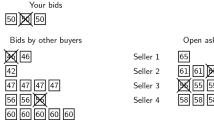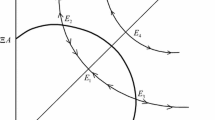Summary
A small trading economy which produces and trades an arbitrary, but finite, number of goods and faces given terms of trade in combination with an uncertain volume of trade is studied. An exogenous probability of trade disruption forces both public and private decision-makers to specialize to a lesser extent in accordance with their comparative advantage. A unique optimal point of production exists for each probability of trade disruption. A private competitive economy will not produce at this point: it produces too much of the good with a comparative advantage.
Similar content being viewed by others
Abbreviations
- C 2 :
-
class of twice continuously differentiable functions
- C i :
-
consumption of goodi
- f:
-
free-trade utility function
- g :
-
autarky utility function
- p :
-
international relative price of goody
- p d :
-
domestic relative price of goody
- Q :
-
solution set of Ψ
- U :
-
utility function
- U :
-
marginal utility of goodi
- U x :
-
marginal utilities of lastn goods
- x :
-
goodx
- x * :
-
autarky production of goodx
- x :
-
free-trade production of goodx
- x pr :
-
private production of goodx
- x 0 :
-
optimal production of goodx
- x m :
-
maximal production of goodx
- y :
-
goody
- Y :
-
income function
- α:
-
private economy equilibrium function
- β :
-
difference function
- ϕ:
-
production possibility function
- ϕx :
-
derivative of ϕ
- π:
-
probability that free trade occurs
- ϱ:
-
indirect utility function
- Ψ:
-
solution function to optimality problem
- c :
-
consumption vector
- p :
-
relative price vector
- x :
-
goods vector
- t :
-
transpose
- R n+ :
-
n-dimensional positive orthant
References
Bergeijk, P.A.G. van, ‘Success and Failure of Economic Sanctions,’Kyklos, XLII (1989a), pp. 385–404.
Bergeijk, P.A.G. van, ‘Trade and Diplomacy. An Extension of the Gravity Analysis,’ Institute of Economic Research, Research Memorandum nr. 320, University of Groningen, 1989b.
Bhagwati, J.N. and T.N. Srinivasan, ‘Optimal Trade Policy and Compensation under Endogeneous Uncertainty: The Phenomenon of Market Disruption,’Journal of International Economics, VI (1976), pp. 317–336.
Helpman, E. and A. Razin, ‘Increasing Returns, Monopolistic Competition, and Factor Movements,’Journal of International Economics, XIV (1983), pp. 263–276.
Hurwicz, L., ‘Optimality and Informational Efficiency in Resource Allocation Process,’ in: K.J. Arrow, S. Karlin and P. Suppes (eds.),Mathematical Methods in the Social Sciences, Stanford, 1960, pp. 27–36.
Knight, F.H.,Risk, Uncertainty and Profit, Boston, [1921] 1939.
Marer, P.,Dollar GNP's of the USSR and Eastern Europe, Baltimore, 1985.
Mayer, W., ‘The National Defense Tariff Argument Reconsidered,’Journal of International Economics, VII (1977), pp. 363–377.
Marrewijk, C. van, ‘Incentive Compatibility and Informational Efficiency,’ Institute of Economic Research, Research Memorandum nr. 249, University of Groningen, Groningen, 1988.
Neumann, J. von and O. Morgenstern,Theory of Games and Economic Behavior, Princeton, 1944.
Polachek, S.W., ‘Trade and Conflict,’Journal of Conflict Resolution, XXIV (1980), pp. 55–78.
Pollins, B., ‘Does Trade Still Follow the Flag?,’ Paper presented at the 3rd World Congress of the Peace Science Society (International), Maryland, 1988.
Pomery, J., ‘Uncertainty in Trade Models,’ in: R.W. Jones and P.B. Kenen (eds.),Handbook of International Economics, Amsterdam, 1984, pp. 419–465.
Ruffin, R.J., ‘International Trade Under Uncertainty,’Journal of International Economics, IV (1974), pp. 243–259.
Sayrs, L. W., ‘New Issues in Trade and Conflict,’Occasional Papers Series, No. 79, University of Iowa, 1988.
Tolley, G. S. and J. D. Wilman, ‘The Foreign Dependence Question,’Journal of Political Economy, LXXXV (1977), pp. 323–347.
Author information
Authors and Affiliations
Additional information
This article communicates the opinion of the author. The views expressed herein are not necessarily shared by his employer.
Comments by Willem Buiter, Casper de Vries and participants at the Buiter Workshop Series at the University of Groningen (May 1989) were very useful.
Rights and permissions
About this article
Cite this article
van Marrewijk, C., van Bergeijk, P.A.G. Trade uncertainty and specialization. Social versus private planning. De Economist 138, 15–32 (1990). https://doi.org/10.1007/BF01718387
Issue Date:
DOI: https://doi.org/10.1007/BF01718387




